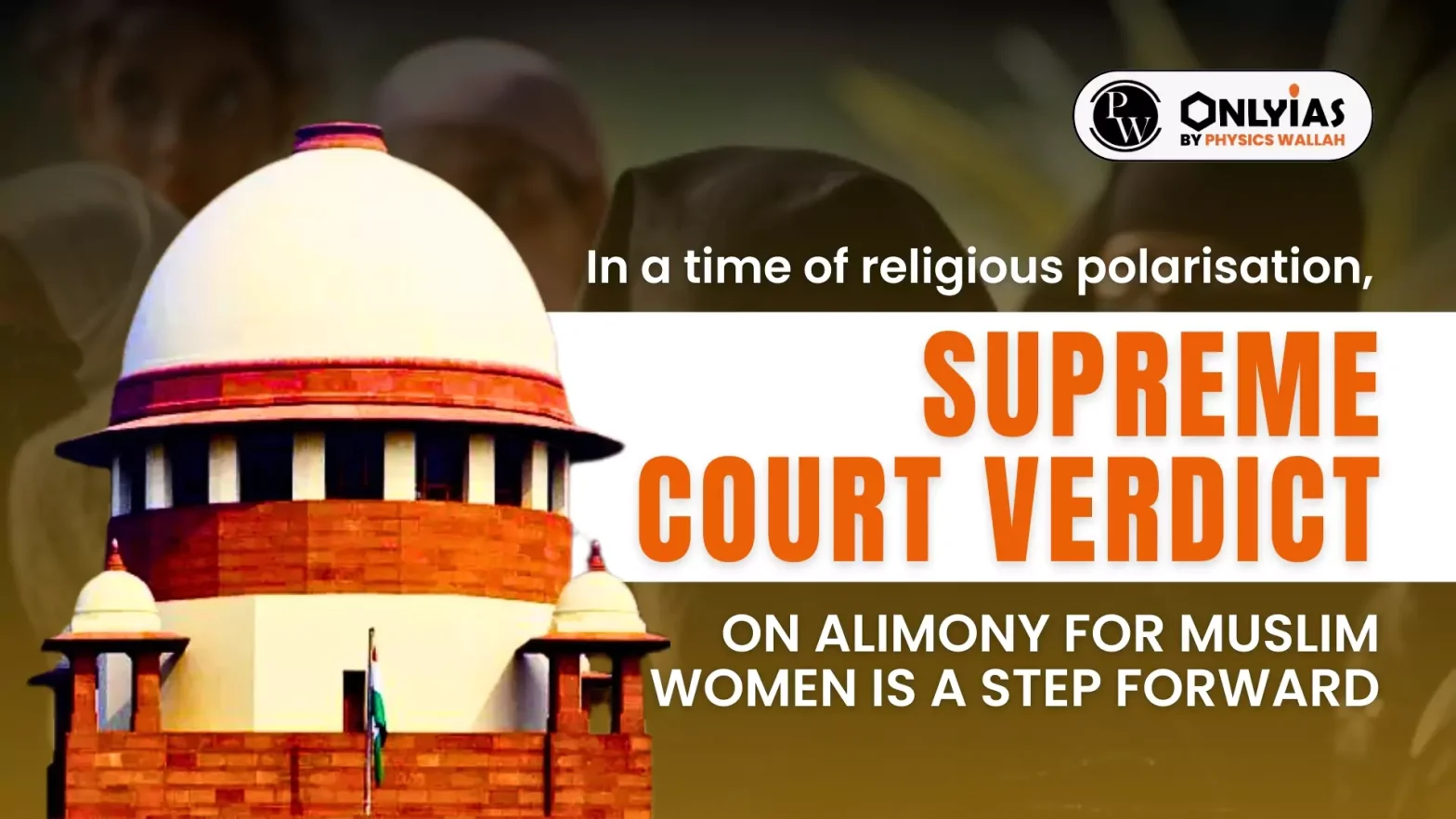In a landmark judgment, the Supreme Court has ruled that a divorced Muslim woman can seek alimony from her husband under section 125 of the Code of Criminal Code (CrPc).
| Relevancy for Prelims: Section 125 of the Code of Criminal Code (CrPc), Shah Bano case, Shariat Application Act, 1937, etc.
Relevancy for Mains: Maintenance rights for Muslim women in India, Challenges in balancing minority rights with gender equality, etc. |
Supreme Court Verdict on Alimony for Muslim Women
- We have travelled a significant distance from the Shah Bano case in 1985 to this verdict by the bench of Justices BV Nagarathna and A G Masih.
- It dismissed the husband’s petition challenging a Telangana High Court direction to pay his wife monthly maintenance of Rs 20,000 after divorce.
- This is a progressive step towards the inclusion of vulnerable minority women citizens.
- Muslim women have suffered legal discrimination in matters of marriage and family in the absence of reformed and codified personal laws.
Enroll now for UPSC Online Course
Why are we celebrating this judgment?
- Section 125 is nothing new, it has existed since 1973.
- Upholding diversity and pluralism is important in a secular democracy.
- This includes a diversity of personal laws.
- But we must not confuse diversity with unjust patriarchal practices.
- There is nothing laudatory or “personal” about the subjugation of women and violation of their rights.
- The Quran emphasises maintenance to be provided to the wife after divorce.
- However, husbands often continue to look for loopholes.
- This happened in the case of Shah Bano.
- Her husband refused to pay the maintenance granted by the court.
- The conservative clergy and other leaders jumped on the bandwagon to defend personal laws and against the imposition of secular laws on Muslims.
- They called it interference in Shariat and thereby, a violation of minority rights.
- The Rajiv Gandhi-led government came under pressure and overturned through legislation the ruling that granted maintenance to Shah Bano.
- A separate Shariat-compliant law was hastily enacted to provide maintenance to divorced Muslim women.
- The BJP began to accuse Congress of Muslim appeasement. In a sense, the Shah Bano episode kickstarted the politics of religious division.
- In seven decades since Independence, no government felt obliged to enable Muslim women to attain legal parity with their Hindu and Christian counterparts who enjoy the protection of reformed personal laws enacted by Parliament.
- No government felt the need to fulfil its constitutional obligation of upholding gender justice.
- As though granting legal rights to Muslim women would go against the principles of secularism!
- Indian Muslims are governed by Shariat Application Act, 1937.
- This law is archaic.
- It merely states that Shariat will decide all personal law matters for Muslims.
- While Muslims are ostensibly governed by Shariat, in reality, unjust and unfair practices based on arbitrary interpretations prevail.
- Several important issues lack legal clarity.
- Patriarchal interpretations decide matters such as age of marriage, divorce, maintenance, polygamy, halala, custody and guardianship of children, share in property and inheritance and muta marriages. Islamic concepts of consent and mehr are diluted in practice.
- Muslim marriage is a contract.
- But most women don’t possess a copy of their nikahnama and are unaware of their rights.
- Moreover, there is a common sense prevalent about the husband being superior in marital relationships.
Check Out UPSC CSE Books From PW Store
Conclusion
The recent judgment reinforces gender justice for Muslim women, challenging patriarchal norms and highlighting the need for reformed, equitable personal laws in a secular democracy.
![]() 12 Jul 2024
12 Jul 2024

